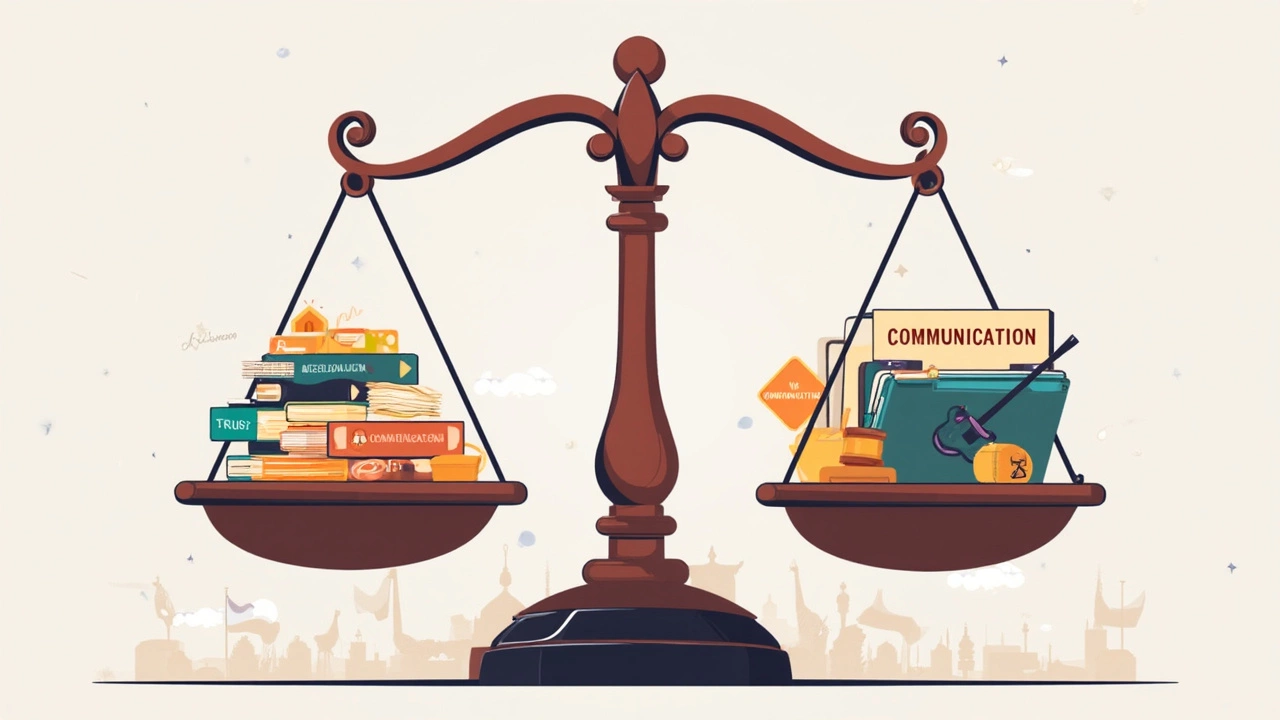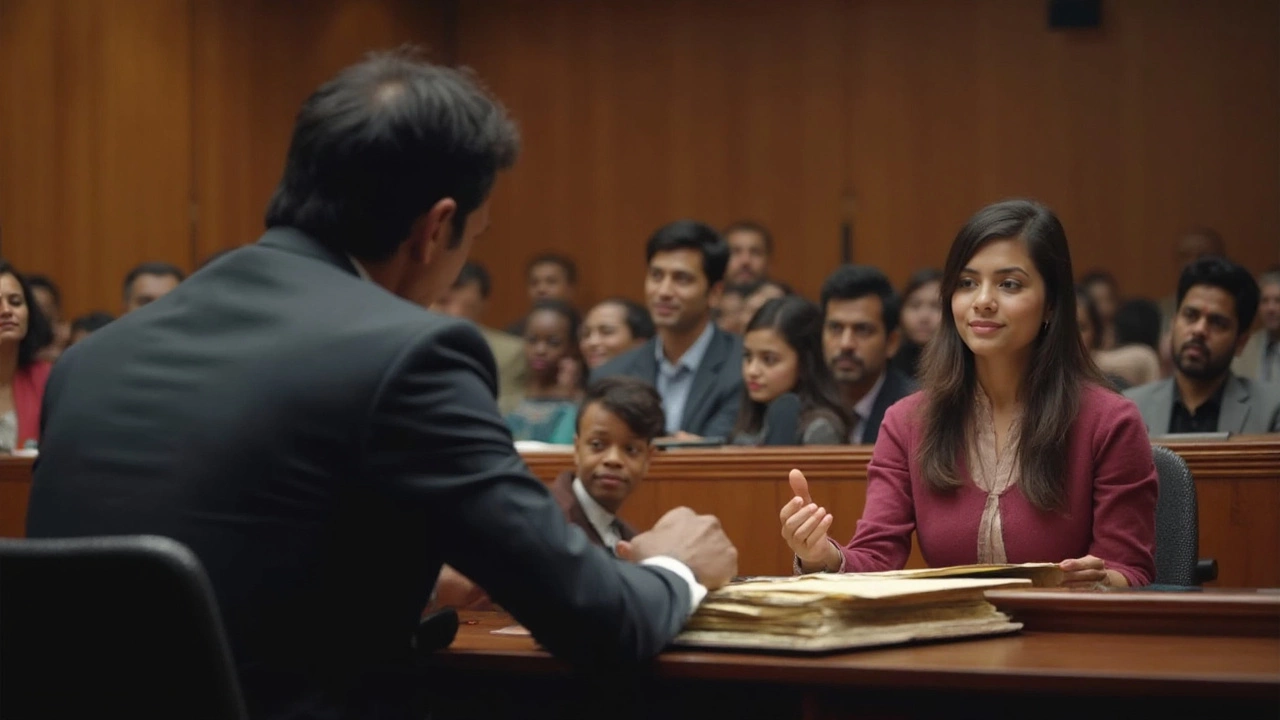Think hiring the wrong family lawyer can't really hurt you? When it comes to custody, divorce, or child support, a single bad move from your lawyer can turn your whole life upside down. So, what do people even call a bad lawyer anyway?
You'll hear names like 'ambulance chaser,' 'shyster,' or just 'incompetent.' These aren't just insults—they point to real problems, like lawyers who chase easy money, cut corners, or simply don't know what they're doing. In family law, the stakes are personal, and trust is everything. One careless email, a missed deadline, or just not showing up fully prepared can cost your kids or your peace of mind.
- How People Describe Bad Lawyers
- Red Flags in Family Law Cases
- Common Ways Bad Lawyers Mess Up
- Why Bad Lawyers Even Exist
- Smart Moves to Avoid a Bad Attorney
How People Describe Bad Lawyers
Most folks don’t use polite phrases when talking about a bad lawyer. The word 'incompetent' crops up a lot. Others go with 'unethical,' 'unreliable,' or 'disorganized.' In legal circles, terms like 'shyster' and 'ambulance chaser' get thrown around for lawyers who care more about their wallets than their clients. Nobody wants to trust their family’s future to someone like that.
Here are some of the most common terms you’ll hear about bad lawyers, and what they actually mean:
- Incompetent: Doesn’t understand the law or makes repeated mistakes.
- Unethical: Cuts corners, bends rules, or crosses legal boundaries.
- Disorganized: Misses deadlines, loses documents, or forgets court dates.
- Unresponsive: Doesn’t call back, ignores emails, or leaves clients in the dark.
- Money-hungry: Seems focused mostly on racking up billable hours.
It’s easy to spot these names in online reviews. People love sharing their experiences, especially if they’ve had a bad one. A Yelp study in 2023 found that over 34% of all negative reviews for family law attorneys mentioned poor communication or lack of professionalism—a huge red flag.
| Term Used | What Clients Most Often Report |
|---|---|
| Incompetent | Mistakes in paperwork, misunderstanding basics |
| Unethical | Lack of transparency, overbilling, shady tactics |
| Unresponsive | No call-backs, missed updates, ignored emails |
| Disorganized | Lost files, missed appointments, confusion |
| Money-hungry | Pushing for unnecessary services, surprise fees |
Family law isn’t like other areas—personal issues and high emotions mean that mistakes hit extra hard. People will remember the lawyer who lost their child custody case because of a missed deadline more than almost anything else. And yep, bad lawyers get called out in court too—judges don’t hold back if someone’s dragging down the process or clearly lost.
Red Flags in Family Law Cases
Spotting a bad lawyer isn’t always as obvious as you’d hope, especially when you’re stressed out by divorce, custody issues, or other family messes. Still, there are some classic red flags that should send you running for the door—or at least getting a second opinion.
- Poor Communication: If your lawyer doesn’t return calls or emails for days, it’s a problem. Family law moves fast and you need updates, not radio silence. A 2024 survey by the American Bar Association showed that 72% of client complaints in family law centered on lack of communication.
- Disorganization: Missed court dates, mix-ups with paperwork, or forgetting key facts? That’s not just sloppy—it can ruin your case. Judges and mediators remember who comes prepared.
- No Strategy: If the lawyer can’t explain their game plan for your case in simple terms, odds are they’re winging it. You deserve someone with a clear approach.
- Always Running Late: Showing up late for meetings or court isn’t just annoying; it signals they might not value your case.
- Shady Billing Practices: Unclear fees, surprise charges, or vague invoices are all signs your attorney isn’t being upfront. Family law is stressful enough—you don’t need mystery bills adding to it.
- Overpromising: Anyone who guarantees certain results in court is probably just saying what you want to hear. Real pros don’t make promises they can’t keep.
Family law is full of emotions and tight deadlines. When a lawyer drops the ball, it can cause permanent damage—not just to you, but to your entire family.
| Red Flag | Potential Consequence |
|---|---|
| Poor Communication | Missed deadlines, unexpected outcomes |
| Disorganization | Lost evidence, case delays, dismissal |
| No Strategy | Weak case in court or mediation |
| Shady Billing | Wasted money, surprise debt |
Want to avoid disaster? Trust your gut, watch for these warning signs, and don’t be afraid to switch if something feels off. Family law is high stakes—get someone who’s really in your corner.

Common Ways Bad Lawyers Mess Up
Even in family law, some lawyers somehow find ways to make simple things complicated—or worse, let your case slip through the cracks. It’s not just about showing up to court; real damage happens when lawyers get lazy, careless, or just don’t know the rules.
- Poor communication: This is the number one complaint clients have. A lawyer who doesn’t return calls or can’t explain what’s going on leaves you stressed and in the dark.
- Missing deadlines: Courts are strict. If your attorney misses, for example, the deadline to file financial disclosures, the judge might throw out your claim, or you could lose rights to alimony or custody considerations.
- Lack of preparation: Some lawyers walk into hearings without knowing your file. They might mix up facts, forget to bring key documents, or freeze when judges ask basic questions.
- Sloppy paperwork: Errors in filing addresses, numbers, or key court forms can delay your case or even get it dismissed. In 2022, California reported nearly 8% of family law cases faced costly delays tied specifically to legal paperwork mistakes.
- Unethical behavior: Billing you for hours they didn’t work, making deals behind your back, or not disclosing conflicts of interest—this goes beyond incompetence. It’s shady, and it puts everything at risk.
Sometimes, bad lawyers even take on more cases than they can handle, treating you like just another file on the desk. This ‘case overload’ problem is more common than you’d think. A 2023 national survey found that 28% of clients who fired or replaced their family law attorney did so because their lawyer was too busy to focus on their case.
| Mistake | % of Clients Affected |
|---|---|
| Poor communication | 42% |
| Missed deadlines | 17% |
| Unprepared in court | 15% |
| Sloppy paperwork | 12% |
| Unethical behavior | 7% |
The point is, these mistakes don’t just bother judges—they can cost you time, money, and maybe even a fair shot at keeping your family whole.
Why Bad Lawyers Even Exist
It’s easy to assume every lawyer is sharp and reliable, but just like in any job, some drop the ball. So why do bad lawyers turn up, especially in family law? First off, there’s the sheer number of lawyers out there. Some finish law school with just enough to scrape by, but still pass the bar on their third or fourth try. Law schools churn out new grads every year, but not everyone is cut out for courtroom drama or tricky negotiations.
Then you’ve got the money factor. Attorneys know people fight hard for family, so some see dollar signs over what’s right. High demand in divorce or custody battles can attract lawyers who care more about billing hours than ending the stress for clients. That’s when you find a so-called bad lawyer who stalls cases, loses focus, or just goes through the motions.
Rules and oversight help somewhat—each state has a bar association to handle complaints or discipline. But the truth? Not every slip-up gets caught. Some lawyers hide behind fancy marketing or fake confidence, even when they fall short on the real work clients actually need. The problem is especially rough in family law where the rules change often, emotions run high, and every case needs serious attention.
Newer lawyers sometimes bite off more than they can handle, overloading on cases or acting like experts without the experience. Others burn out, which leads to sloppy work or poor communication. And let’s be honest—some just don’t care. That’s why it’s so important to check real reviews and dig a little deeper before you trust someone with your family’s future.

Smart Moves to Avoid a Bad Attorney
You don’t need a law degree to steer clear of a bad lawyer. But, you do have to be a bit strategic. Before you sign any paperwork or hand over your hard-earned money, you need to do some homework.
Checking online reviews is a no-brainer, but don’t just rely on star ratings. Look for detailed stories about how lawyers handled real situations—especially tough custody battles, tricky support disputes, and property splits. If different reviewers mention late filings or missed court dates, that’s a massive warning sign.
Don’t skip in-person or virtual consultations. This is your shot to ask specific questions. Throw some direct questions their way—like, “How many cases like mine have you handled?” or “What’s your approach if the other side won’t negotiate?” Watch how they answer. If they give you vague or rehearsed answers, that’s a red flag. No lawyer can guarantee results, so if they promise you the moon, head for the exit.
- Ask for a written agreement on fees—flat rates and hourly rates should be clear.
- Check their status with your state bar. You can do this online—look for any past or pending disciplinary action.
- Notice if they communicate well right from the start. Quick, clear replies are a must. If they’re slow or forgetful now, it won’t get better later.
According to a 2023 study by Martindale-Nolo, “Almost 40% of family law clients who switched attorneys did so because their lawyer ignored calls and emails.” You want a lawyer who keeps you in the loop, not one who ghosts you.
“Choosing the right lawyer for your divorce or custody case may be the most important decision you make,” says Nancy Kase Kennedy, a veteran family law attorney in California. “You should feel respected, listened to, and clear about costs and next steps.”
Here’s a quick table you can use when weighing your options:
| What to Check | Why It Matters |
|---|---|
| Bar status/discipline | Confirms active, good standing |
| Detailed reviews | Spot trends in client experiences |
| Communication style | Helps avoid misunderstandings |
| Fee transparency | Prevents surprise costs |
| Specialization | Ensures relevant experience in family law |
Bringing a friend to your initial meeting can help, too—they’ll notice things you might miss. At the end of the day, if you feel uneasy, trust your gut. The wrong attorney is always worse than no attorney at all in family law.
